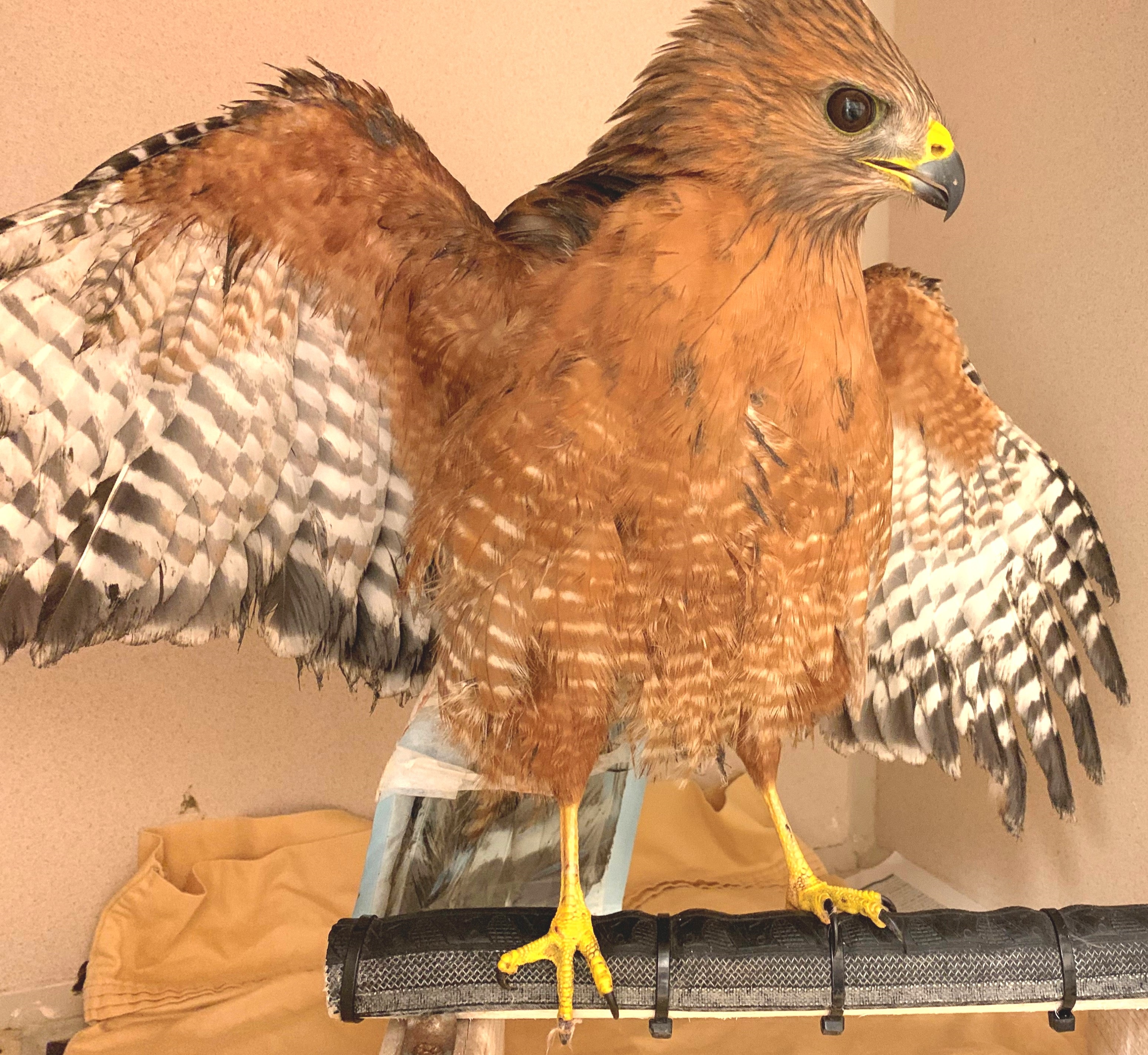Red-Shouldered Hawk with Anticoagulant Rodenticide Toxicosis
By Dr. Stephany Lewis, Veterinarian
This winter, CWC admitted an adult male Red-Shouldered

Red-Shouldered Hawk
Photo by Johanna Molina
Hawk after he was found on the ground in Santa Monica, too weak to fly. On physical examination, his only injury was a very small laceration on his toe, only about 5 mm in length, yet his feathers were completely soaked with blood and the laceration was actively bleeding. The mucous membranes in his mouth were pale white, and he was so weak that he couldn’t stand, wouldn’t open his eyes, and was barely responsive to external stimuli. A small amount of blood was collected from the bird for some basic bloodwork. He was found to be severely anemic, with 5 times less red blood cells than normal.
Sadly, those of us working in wildlife rehabilitation know that there is only one thing that could cause these clinical signs in a bird of prey. This bird was suffering from anticoagulant rodenticide toxicosis. Anticoagulant rodenticides are rat poisons that cause death to rodents by preventing their ability to clot their blood. Non-target species, such as Hawks, Owls, Bobcats, Coyotes, and Mountain Lions are exposed to these compounds by ingesting the rodents that have eaten these poisons. The poisons do not kill the rodents immediately, but rather slowly weaken them and make them easier prey. Some of these compounds, such as brodifacoum, difethialone, and bromadiolone, are known as “second generation anticoagulant rodenticides”. These compounds were invented in the 1970s in response to rodents becoming resistant to the “first generation” compounds, such as warfarin. One of the differences between the first and second generation rodenticides is also what makes the second generation compounds so much more dangerous for wildlife; they last for a very long time in the body. This means that non-target wildlife species can ingest multiple small doses over long periods of time until they build up levels high enough that they are no longer able to clot their blood. This has disastrous consequences. Animals can bleed into their lungs, causing severe distress, as well as into their brains, eyes, joints, and muscles, causing severe pain and permanent disabilities. Or, like our Red-Shouldered Hawk patient, they can lose all of their blood through what should be an inconsequential wound. Additionally, Bobcats and Mountain Lions are believed to suffer deleterious impact on their immune systems due to chronic exposure to these poisons, making them more susceptible to illness and death from infectious diseases such as mange.
Luckily for our Red-Shouldered Hawk patient, there is an antidote to these poisons, and it is just a simple vitamin, vitamin K. This treatment needs to be given daily for four weeks. Additionally, he received fluid therapy for the first week (a blood transfusion would be the preferred treatment but is unfortunately not an option for our unique patients). This bird actually had a catheter placed into a bone in his wing to quickly replenish blood volume and blood pressure after such drastic blood loss.
Forty-three days after he arrived, our Red-Shouldered Hawk had normal bloodwork, was well-conditioned, flying beautifully in one of our flight pens, and ready to be released! This was a wonderful outcome for this patient, but sadly most of the rodenticide victims who come to us are not as lucky. Because they arrive very late in the course of their illness, the majority of them pass away in the first 24 hours, before our vitamin K therapy has had time to work. Every patient who passes away due to rat poison is submitted for examination by biologists at the California Department of Fish and Wildlife to confirm the cause of death and aid research proving how damaging these poisons are to our native wildlife. The exposure frequency of wildlife to these compounds continues to be astounding, despite previous legislation made to limit their use. Scientists continue to detect these compounds in anywhere from 79 to 100% of animals tested, and in many cases, 3 – 6 different compounds are detected in the same individual.
Anticoagulant rodenticides pose a substantial and far-reaching threat to wildlife and ecosystem health. A California bill, AB1788, has reached the State Senate, and if passed will greatly restrict use of these poisons in our state. CWC is so grateful for everyone who has been working tirelessly to get this bill passed, and we hope you join us in urging your senator to pass this important legislation! Our wildlife deserves poison-free food!

Just one of thousands of examples of how dangerous mankind is to animals and our environment. Thank you for bringing this information to our attention.
Let’s hope this prompts more people to take action and press politicians to pass the proper laws to stop the use of these unnecessary products.
Richard
We hope so too, Richard. Thank you for your support.